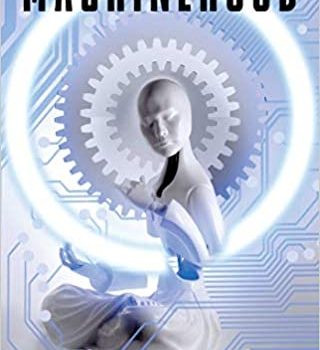Ian Mond Reviews Machinehood by S.B. Divya
 Machinehood, S.B. Divya (Saga 978-1-982-14806-5, $27.00, 416pp) March 2021.
Machinehood, S.B. Divya (Saga 978-1-982-14806-5, $27.00, 416pp) March 2021.
S.B. Divya’s debut Machinehood is that rare thing in contemporary science fiction: a novel with a near-future setting that’s not a dystopia or post-apocalyptic hellscape. To be clear, Divya’s rendition of the late 21st century (the story takes place in 2095) isn’t all shining cities and jetpacks. Climate change has made parts of the planet uninhabitable, with most people living in high-density towers (or hives). Surveillance is ubiquitous, an almost endless supply of micro-drones recording everything (and I mean everything), and people have become heavily reliant on bots and their personal AI assistants to undertake mundane tasks while also enhancing their performance with biomechanically engineered pills. What’s not present is a totalitarian regime taking advantage of the devastation wrought by global warming and advanced technology to control large swathes of the population or persecute minority groups. Yes, there’s the al-Muwahhidun Empire rolling through North-West Africa, but other than acting as the novel’s boogeyman, we only get glimpses of life under the Caliphate. Most of the novel occurs in the United States and India, where democracy still functions and where people are, for the most part, free (or no less free than they are now).
That’s not to say that Divya’s future is one I’m looking forward to. The novel taps into the growing uneasiness around the labour market, the growth of the gig economy, the possibility that we might be automating ourselves out of a meaningful existence. With bots dominating the workforce, the only way people can compete is to take pills – flows, zips, and buffs – that significantly improve mental and physical faculties. This is the case for our two protagonists, Olga “Welga” Ramirez and her sister-in-law Nithya. As an ex-US marine-cum-bodyguard, Welga uses the zips to augment her speed and reaction times when protecting her multi-squillionaire clients. For Nithya, a biogeneticist and her family’s only bread-winner, the flow sharpens her mind, enhancing her capacity to tweak and improve pills for the very “funders” her sister-in-law safeguards.
This dependency on highly advanced pharmaceuticals reveals the underlying and unresolved tension of Divya’s near future: the divide between those who fear an AI uprising (such as the Caliphate) and those who believe that “the time has come to end the distinction between organic and inorganic intelligence;” that all “deserve the right of personhood.” That tension boils over when a previously unheard-of machine-rights activist group, calling itself the “Machinehood,” strike out against the funders, murdering Welga’s client and demanding that all pill production cease “or we will make it happen.” Welga is approached by her old bosses in US intelligence – the very same people she swore never to work for again after a botched mission against the Caliphate – to run a covert operation in Marrakech to determine whether the al-Muwahhidun are funding the Machinehood. Against her better judgement, Welga agrees to the mission, hiding the fact she’s facing her own ticking time bomb. Nithya has confirmed that Welga’s recent bout of muscle spasm and tremors is the direct result of the zips, and if she keeps taking them the neurological damage could be permanent.
As I note above, it’s refreshing to read a science fiction novel that considers the possibility of a livable future. While the emphasis is on Welga’s storyline, it’s through Nithya that we get a feel for everyday life, both the difficulties, such as her husband being out of work, and also the advantages, such as access to 3D printing and a smart metal called blox that allows Nithya to remodel her living space almost instantly. And although Nithya never goes much further than her apartment in Chennai, she is involved in some of the novel’s more bold and courageous moments. She not only risks her career and her family’s only source of income by exposing the health risks of an over-reliance on pills, but an unexpected pregnancy puts Nithya’s work (she won’t be able to take flow) and her marriage (her husband is a staunch Catholic who won’t support an abortion) in jeopardy. As a thriller, though, I found Machinehood less convincing. For the first half of the novel, Divya does a terrific job parceling out her worldbuilding, avoiding the knee-jerk compulsion to spell out concepts and neologisms the moment they’re introduced, but, as the action heats up, Divya begins to lose confidence in her reader, with Welga and Nithya prone to over-explaining the plot both to themselves and others. It doesn’t help that I figured out who the Big Bad was well before Welga did. Having said that, I enjoyed the last third, particularly the growing tension around Welga’s illness, but also the nuanced, albeit misguided motivations of the villain. The sometimes stodginess of the story-telling doesn’t detract from Machinehood‘s dystopia-free depiction of a near-future that still acknowledges the challenges we all face.
This review and more like it in the March 2021 issue of Locus.
 While you are here, please take a moment to support Locus with a one-time or recurring donation. We rely on reader donations to keep the magazine and site going, and would like to keep the site paywall free, but WE NEED YOUR FINANCIAL SUPPORT to continue quality coverage of the science fiction and fantasy field.
While you are here, please take a moment to support Locus with a one-time or recurring donation. We rely on reader donations to keep the magazine and site going, and would like to keep the site paywall free, but WE NEED YOUR FINANCIAL SUPPORT to continue quality coverage of the science fiction and fantasy field.
©Locus Magazine. Copyrighted material may not be republished without permission of LSFF.







